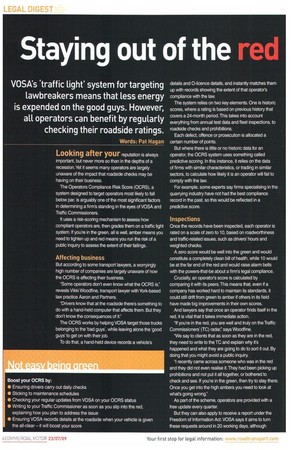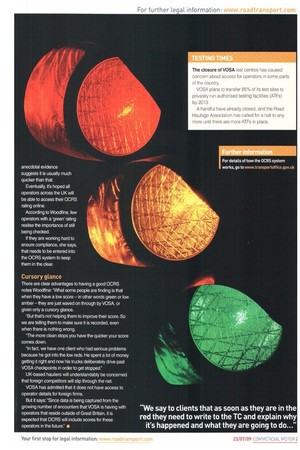Staying out of the red
Page 26

Page 27

If you've noticed an error in this article please click here to report it so we can fix it.
VOSA's 'traffic light system for targeting lawbreakers means that less energy is expended on the good guys. However, all operators can benefit by regularly checking their roadside ratings.
Words: Pat Hagan Looking after your reputation is always important. but never more so than in the depths of a recession. Yet it seems many operators are largely unaware of the impact that roadside checks may be having on their business.
The Operators Compliance Risk Score (OCRS), a system designed to target operators most likely to fall below par, is arguably one of the most significant factors in determining a firm's standing in the eyes of VOSA and Traffic Commissioners.
It uses a risk-scoring mechanism to assess how compliant operators are, then grades them on a traffic light system. If you're in the green, all is well, amber means you need to tighten up and red means you run the risk of a public inquiry to assess the extent of their failings
Affecting business
But according to some transport lawyers, a worryingly high number of companies are largely unaware of how the OCRS is affecting their business.
"Some operators don't even know what the OCRS is." reveals Vikki Woodfine, transport lawyer with York-based law practice Aaron and Partners.
-Drivers know that at the roadside there's something to do with a hand-held computer that affects them. But they don't know the consequences of it."
The OCRS works by helping VOSA target those trucks belonging to the -bad guys', while leaving alone the 'good guys to get on with their job
To do that, a hand-held device records a vehicle's details and 0-licence details, and instantly matches them up with records showing the extent of that operator's compliance with the law.
The system relies on two key elements. One is historic scores, where a rating is based on previous history that covers a 24-month period. This takes into account everything from annual test data and fleet inspections, to roadside checks and prohibitions Each defect, offence or prosecution is allocated a certain number of points, But where there is little or no historic data for an operator, the OCRS system uses something called predictive scoring In this instance, it relies on the data of firms with similar characteristics, or trading in similar sectors, to calculate how likely it is an operator will fail to comply with the law.
For example, some experts say firms specialising in the quarrying industry have not had the best compliance record in the past, so this would be reflected in a predictive score.
inspections
Once the records have been inspected, each operator is rated on a scale of zero to 10, based on roadworthiness and traffic-related issues, such as drivers' hours and weighted checks.
A zero score would be well into the green and would constitute a completely clean bill of health, while 10 would be at the far end of the red and would raise alarm bells with the powers-that-be about a firm's legal compliance.
Crucially, an operator's score is calculated by comparing it with its peers. This means that, even if a company has worked hard to maintain its standards. it could still drift from green to amber if others in its field have made big improvements in their own scores.
And lawyers say that once an operator finds itself in the red, it is vital that it takes immediate action.
-If you're in the red, you are well and truly on the Traffic Commissioners' (IC) radar," says Woodfine
"We say to clients that as soon as they are in the red, they need to write to the TC and explain why it's happened and what they are going to do to sort it out. By doing that you might avoid a public inquiry.
"I recently came across someone who was in the red and they did not even realise it. They had been picking up prohibitions and not put It all together, or bothered to check and see If you're in the green, then try to stay there. Once you get into the high ambers you need to look at what's going wrong."
As part of the scheme, operators are provided with a free update every quarter.
But they can also apply to receive a report under the Freedom of Information Act VOSA says it aims to turn these requests around in 20 working days, although anecdotal evidence suggests it is usually much quicker than that.
Eventually, it's hoped all operators across the UK will be able to access their OCRS rating online According to Woodfine, few operators with a 'green' rating realise the importance of still being checked.
If they are working hard to ensure compliance, she says, that needs to be entered into the OCRS system to keep them in the dear.
Cursory glance
There are clear advantages to having a good OCRS notes Woodfine: "What some people are finding is that when they have a low score — in other words green or low amber — they are just waved on through by VOSA, or given only a cursory glance.
"But that's not helping them to improve their score So we are telling them to make sure it is recorded, even when there is nothing wrong The more clean stops you have the quicker your score comes down `In fact we have one client who had serious problems because he got into the low reds He spent a lot of money getting it right and now his trucks deliberately drive past VOSA checkpoints in order to get stopped" UK-based hauliers will understandably be concerned that foreign competitors will slip through the net VOSA has admitted that it does not have access to operator details for foreign firms
But it says: Since data is being captured from the growing number of encounters that VOSA is having with operators that reside outside of Great Britain, it is expected that OCRS will include scores for these Operators in the future:.








































































































































